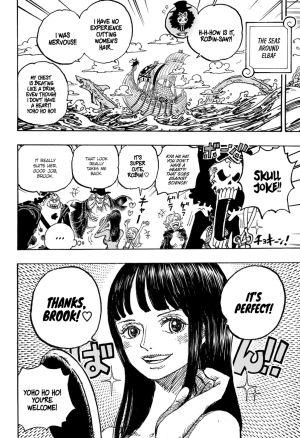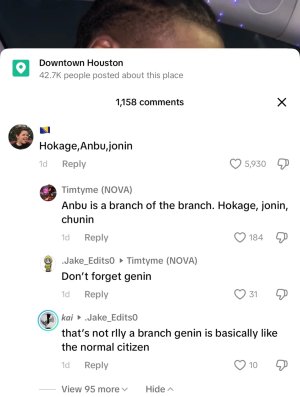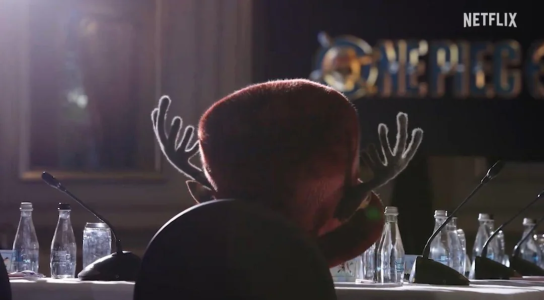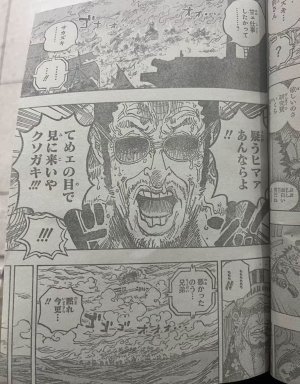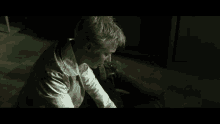Navigation
Install the app
How to install the app on iOS
Follow along with the video below to see how to install our site as a web app on your home screen.
Note: This feature may not be available in some browsers.
More options
You are using an out of date browser. It may not display this or other websites correctly.
You should upgrade or use an alternative browser.
You should upgrade or use an alternative browser.
The Official Anime & Manga Thread Vol: 三
- Sep 25, 2013
- 1,503
- 515
Last week I posted an article from I read on the unofficial One Piece Podcast website that analyzed Law's name in relation to the historical events and figures associated with it. This week there's a new article that's pretty good analyzing mainly Christian and religious references from Law's flashback, but also touches on earlier religious references. I thought it was pretty interesting It has Dressrosa spoilers as well by the way.
The podcast is pretty good by the way, sometimes they have people from Funimation come on, either people who work on OP or the english voice actors, sometimes they have other comic artists, or a guy who works on Rick and Morty, and every week they have the official english translator for the Viz media release of OP to clarify dialogue and what not. They also released a documentary called OPP Japan, where they interviewed people who know Oda and went to different OP attractions in Japan.
Anyway here's the latest article to read if interested.
The podcast is pretty good by the way, sometimes they have people from Funimation come on, either people who work on OP or the english voice actors, sometimes they have other comic artists, or a guy who works on Rick and Morty, and every week they have the official english translator for the Viz media release of OP to clarify dialogue and what not. They also released a documentary called OPP Japan, where they interviewed people who know Oda and went to different OP attractions in Japan.
Anyway here's the latest article to read if interested.
http://onepiecepodcast.com/2014/12/23/chao-time-that-saved-a-wretch-like-law/
It is no secret that Eiichiro Oda does quite a lot of research for his work. Not only does he tackle world history and ancient mythology, he also touches upon the histories various cultures and religions. Rich in symbolism, the Bible is no exception. Oda has previously made quite a number of references to the Bible throughout One Piece. Two gigantic King Bulls that appeared in the Enies Lobby arc are named after the two biblical cities Sodom and Gomorrah, which were decimated with a rain of fire and brimstone. The Treasure Tree Adam and the Sunshine Tree Eve are named after the first man and woman in the creation myth of Genesis. Usopp even wondered if the two trees are related. The gigantic ark Noah located near Fishman Island also served as a reference to the eponymous Noah. In the Biblical book of Genesis, Noah was commanded by God to build a large ark to save his family as well as various animals from a great flood.
 Looking back to the narrative of Law’s flashback, it can be extrapolated that his back story has parallels with the New Testament. As shown in Law’s flashback, the Donquixotes are quite reminiscent of the story of Jesus Christ. Having descended from their godly positions in Mariejois to live with their fellow humans, Doflamingo and his family ended up getting crucified by the masses. Homing’s declaration of being humans may also be an allusion to Jesus Christ, who is considered to be fully God and fully human according to Christianity. When the family was hung on the wall, the scene resembled that of the crucifixion of Jesus Christ where he was crucified along with two thieves, know as the “penitent thief” and the “impenitent thief.” The penitent thief was crucified to the right hand of Jesus Christ, while the impenitent thief, who taunted Jesus, was to his left. Rocinante was hung to the right hand of his father, but became a member of the Navy later on in his life. Doflamingo was hung to the left of his father and went on to threaten the masses of citizens, despite being the one crucified on the wall.
Looking back to the narrative of Law’s flashback, it can be extrapolated that his back story has parallels with the New Testament. As shown in Law’s flashback, the Donquixotes are quite reminiscent of the story of Jesus Christ. Having descended from their godly positions in Mariejois to live with their fellow humans, Doflamingo and his family ended up getting crucified by the masses. Homing’s declaration of being humans may also be an allusion to Jesus Christ, who is considered to be fully God and fully human according to Christianity. When the family was hung on the wall, the scene resembled that of the crucifixion of Jesus Christ where he was crucified along with two thieves, know as the “penitent thief” and the “impenitent thief.” The penitent thief was crucified to the right hand of Jesus Christ, while the impenitent thief, who taunted Jesus, was to his left. Rocinante was hung to the right hand of his father, but became a member of the Navy later on in his life. Doflamingo was hung to the left of his father and went on to threaten the masses of citizens, despite being the one crucified on the wall.
The chapter before Doflamingo’s flashback featured the 13 members of the Donquixote family eating together around a large table. This scene bears some semblance to the Last Supper by Leonardo da Vinci, where Jesus and his twelve disciples came together for a final meal together. Amusingly, the one shown sitting in the middle of the family is Trebol, whereas most portrayals of the Last Supperhave Jesus sitting in the center. The Donquixote family were also shown eating Italian food, which included garlic bread and red wine. The Last Supper featured bread and wine, which symbolizes the blood and body of Christ respectively. Red wine was also shown rather prominently throughout the Trafalgar Law flashback.
Donquixote family eating together around a large table. This scene bears some semblance to the Last Supper by Leonardo da Vinci, where Jesus and his twelve disciples came together for a final meal together. Amusingly, the one shown sitting in the middle of the family is Trebol, whereas most portrayals of the Last Supperhave Jesus sitting in the center. The Donquixote family were also shown eating Italian food, which included garlic bread and red wine. The Last Supper featured bread and wine, which symbolizes the blood and body of Christ respectively. Red wine was also shown rather prominently throughout the Trafalgar Law flashback.
 Further into the flashback, Rocinante made quite an effort to help a kid he barely knew, to the point where he abandoned his mission and betrayed both his brother and the Navy. His altruism towards Law can be compared to the actions of the Samaritan in the parable of the Good Samaritan. To those not familiar with the story, the Samaritan was a man who helped an injured traveler and took care of all his needs. The parable shows that one must be compassionate towards one’s enemies. Law should have been considered Rocinante’s enemy since he was a pirate and a part of the D clan and Corazon was a member of the Donquixote family and a member of the Navy. Despite this, Rocinante decided to save Law when he was dying from the White Lead poisoning. Like the Samaritan who took the injured man to the inn and paid for all his needs during his stay, Rocinante visited hospitals across the North Blue looking for doctors who could cure Law.
Further into the flashback, Rocinante made quite an effort to help a kid he barely knew, to the point where he abandoned his mission and betrayed both his brother and the Navy. His altruism towards Law can be compared to the actions of the Samaritan in the parable of the Good Samaritan. To those not familiar with the story, the Samaritan was a man who helped an injured traveler and took care of all his needs. The parable shows that one must be compassionate towards one’s enemies. Law should have been considered Rocinante’s enemy since he was a pirate and a part of the D clan and Corazon was a member of the Donquixote family and a member of the Navy. Despite this, Rocinante decided to save Law when he was dying from the White Lead poisoning. Like the Samaritan who took the injured man to the inn and paid for all his needs during his stay, Rocinante visited hospitals across the North Blue looking for doctors who could cure Law.
Reading the story from a Christian perspective, the relationship between Rocinante , Law, and Doflamingo can be seen as a parallel to God, the sinner, and the Devil respectively. In Christian beliefs, it is taught that God loves humanity and wants to redeem them. Similarly, Rocinante showed unconditional love for Law, even though the latter tried to kill him. On the other hand, the Devil wants to lead humanity to their own ruin, similar to how Doflamingo wants to use Law for his own gain after eating the Op-Op Fruit.
Ironically, the D clan was referred to as the enemies of God, implying that they’re demons. However, Doflamingo’s epithet is translated as Heavenly Demon in the English version, likening him to a fallen angel. However, his epithet in Japanese is 天夜叉 (Ten’yasha), which refers to the Yaksha. Unlike the Christian devil, Yaksha refers to a class of nature spirits in Buddhist, Hindu, and J
 ain literature. The Yaksha are described as having a dual personality, where it haunts and devours travelers while in its malevolent personality.
ain literature. The Yaksha are described as having a dual personality, where it haunts and devours travelers while in its malevolent personality.
As salvation is also the central theme of Christianity, Oda seems to have made use of Christian elements to reinforce this point, giving some depth into flashback. It teaches that even those who are lost can be guided back in the right path, and that an act of kindness can have a big impact on others. While it doesn’t necessarily mean that Law is on the side of good, it does emphasize that he will not become a vile character like Doflamingo.
On that note, Merry Christmas and Happy Holidays everyone!
It is no secret that Eiichiro Oda does quite a lot of research for his work. Not only does he tackle world history and ancient mythology, he also touches upon the histories various cultures and religions. Rich in symbolism, the Bible is no exception. Oda has previously made quite a number of references to the Bible throughout One Piece. Two gigantic King Bulls that appeared in the Enies Lobby arc are named after the two biblical cities Sodom and Gomorrah, which were decimated with a rain of fire and brimstone. The Treasure Tree Adam and the Sunshine Tree Eve are named after the first man and woman in the creation myth of Genesis. Usopp even wondered if the two trees are related. The gigantic ark Noah located near Fishman Island also served as a reference to the eponymous Noah. In the Biblical book of Genesis, Noah was commanded by God to build a large ark to save his family as well as various animals from a great flood.
 Looking back to the narrative of Law’s flashback, it can be extrapolated that his back story has parallels with the New Testament. As shown in Law’s flashback, the Donquixotes are quite reminiscent of the story of Jesus Christ. Having descended from their godly positions in Mariejois to live with their fellow humans, Doflamingo and his family ended up getting crucified by the masses. Homing’s declaration of being humans may also be an allusion to Jesus Christ, who is considered to be fully God and fully human according to Christianity. When the family was hung on the wall, the scene resembled that of the crucifixion of Jesus Christ where he was crucified along with two thieves, know as the “penitent thief” and the “impenitent thief.” The penitent thief was crucified to the right hand of Jesus Christ, while the impenitent thief, who taunted Jesus, was to his left. Rocinante was hung to the right hand of his father, but became a member of the Navy later on in his life. Doflamingo was hung to the left of his father and went on to threaten the masses of citizens, despite being the one crucified on the wall.
Looking back to the narrative of Law’s flashback, it can be extrapolated that his back story has parallels with the New Testament. As shown in Law’s flashback, the Donquixotes are quite reminiscent of the story of Jesus Christ. Having descended from their godly positions in Mariejois to live with their fellow humans, Doflamingo and his family ended up getting crucified by the masses. Homing’s declaration of being humans may also be an allusion to Jesus Christ, who is considered to be fully God and fully human according to Christianity. When the family was hung on the wall, the scene resembled that of the crucifixion of Jesus Christ where he was crucified along with two thieves, know as the “penitent thief” and the “impenitent thief.” The penitent thief was crucified to the right hand of Jesus Christ, while the impenitent thief, who taunted Jesus, was to his left. Rocinante was hung to the right hand of his father, but became a member of the Navy later on in his life. Doflamingo was hung to the left of his father and went on to threaten the masses of citizens, despite being the one crucified on the wall.The chapter before Doflamingo’s flashback featured the 13 members of the
 Donquixote family eating together around a large table. This scene bears some semblance to the Last Supper by Leonardo da Vinci, where Jesus and his twelve disciples came together for a final meal together. Amusingly, the one shown sitting in the middle of the family is Trebol, whereas most portrayals of the Last Supperhave Jesus sitting in the center. The Donquixote family were also shown eating Italian food, which included garlic bread and red wine. The Last Supper featured bread and wine, which symbolizes the blood and body of Christ respectively. Red wine was also shown rather prominently throughout the Trafalgar Law flashback.
Donquixote family eating together around a large table. This scene bears some semblance to the Last Supper by Leonardo da Vinci, where Jesus and his twelve disciples came together for a final meal together. Amusingly, the one shown sitting in the middle of the family is Trebol, whereas most portrayals of the Last Supperhave Jesus sitting in the center. The Donquixote family were also shown eating Italian food, which included garlic bread and red wine. The Last Supper featured bread and wine, which symbolizes the blood and body of Christ respectively. Red wine was also shown rather prominently throughout the Trafalgar Law flashback. Further into the flashback, Rocinante made quite an effort to help a kid he barely knew, to the point where he abandoned his mission and betrayed both his brother and the Navy. His altruism towards Law can be compared to the actions of the Samaritan in the parable of the Good Samaritan. To those not familiar with the story, the Samaritan was a man who helped an injured traveler and took care of all his needs. The parable shows that one must be compassionate towards one’s enemies. Law should have been considered Rocinante’s enemy since he was a pirate and a part of the D clan and Corazon was a member of the Donquixote family and a member of the Navy. Despite this, Rocinante decided to save Law when he was dying from the White Lead poisoning. Like the Samaritan who took the injured man to the inn and paid for all his needs during his stay, Rocinante visited hospitals across the North Blue looking for doctors who could cure Law.
Further into the flashback, Rocinante made quite an effort to help a kid he barely knew, to the point where he abandoned his mission and betrayed both his brother and the Navy. His altruism towards Law can be compared to the actions of the Samaritan in the parable of the Good Samaritan. To those not familiar with the story, the Samaritan was a man who helped an injured traveler and took care of all his needs. The parable shows that one must be compassionate towards one’s enemies. Law should have been considered Rocinante’s enemy since he was a pirate and a part of the D clan and Corazon was a member of the Donquixote family and a member of the Navy. Despite this, Rocinante decided to save Law when he was dying from the White Lead poisoning. Like the Samaritan who took the injured man to the inn and paid for all his needs during his stay, Rocinante visited hospitals across the North Blue looking for doctors who could cure Law.Reading the story from a Christian perspective, the relationship between Rocinante , Law, and Doflamingo can be seen as a parallel to God, the sinner, and the Devil respectively. In Christian beliefs, it is taught that God loves humanity and wants to redeem them. Similarly, Rocinante showed unconditional love for Law, even though the latter tried to kill him. On the other hand, the Devil wants to lead humanity to their own ruin, similar to how Doflamingo wants to use Law for his own gain after eating the Op-Op Fruit.
Ironically, the D clan was referred to as the enemies of God, implying that they’re demons. However, Doflamingo’s epithet is translated as Heavenly Demon in the English version, likening him to a fallen angel. However, his epithet in Japanese is 天夜叉 (Ten’yasha), which refers to the Yaksha. Unlike the Christian devil, Yaksha refers to a class of nature spirits in Buddhist, Hindu, and J

As salvation is also the central theme of Christianity, Oda seems to have made use of Christian elements to reinforce this point, giving some depth into flashback. It teaches that even those who are lost can be guided back in the right path, and that an act of kindness can have a big impact on others. While it doesn’t necessarily mean that Law is on the side of good, it does emphasize that he will not become a vile character like Doflamingo.
On that note, Merry Christmas and Happy Holidays everyone!
- Apr 27, 2014
- 10,930
- 9,250
I think some of ya'll thinking too deep into this ****
- Mar 3, 2012
- 23,082
- 8,730
You just hate this current arc. lol
- Oct 11, 2013
- 3,240
- 857
Just Started Akame Ga Trill
FInished Fate/stay Night
and binge read ansatsu kyou****su
FInished Fate/stay Night
and binge read ansatsu kyou****su
- Sep 25, 2013
- 1,503
- 515
I think some of ya'll thinking too deep into this ****
I didn't write the article, I just read it and shared it. You were the one talking about kubo being a genius due to the references in his writing that can get lost in translation? Is this not the same thing with references or symbolism that can be missed by not examining panels or just being uniformed? It adds layers to the story, what's the issue? Do people look too much into stories, yeah that's how you get wild theories and stuff but it's all fun.
- May 11, 2013
- 1,481
- 353
And both articles you posted had good evidence and reasoning, so It wasn't like they are reaching.I didn't write the article, I just read it and shared it. You were the one talking about kubo being a genius due to the references in his writing that can get lost in translation? Is this not the same thing with references or symbolism that can be missed by not examining panels or just being uniformed? It adds layers to the story, what's the issue? Do people look too much into stories, yeah that's how you get wild theories and stuff but it's all fun.
- Jan 27, 2008
- 6,149
- 325
 she just would not listen
she just would not listengreat ep of Parasyte
- Oct 11, 2013
- 3,240
- 857
which is better, anime or manga for Akame?
- Jun 15, 2013
- 21
- 19
I got too impatient waiting for Stardust Crusaders season two that I watched the 90s OVA and read the manga.
Vanilla Ice

DIO

Star Platinum

RIP Kakyokin and Iggy


DIO

Star Platinum

RIP Kakyokin and Iggy

Last edited:
- Mar 28, 2009
- 18,488
- 6,333
Everyone says mangawhich is better, anime or manga for Akame?
- Apr 27, 2014
- 10,930
- 9,250
Akame manga is infinitely superior although I admit the series in general is a bit generic and doesn't really do anything new
Tolkien and Oda actually are very similar within certain aspects; most especially through their usage of naming conventions (Tolkien would draw inspiration for his names and places from ancient languages like Old English, Old German, Norse, etc, and Oda tends to focus on European naval history or the Age of Exploration)
All I'm saying is sometimes a cigar is just a cigar
I say this because I look at Oda as kind of a Japanese JRR Tolkien; a dude with an entire universe in his head that he's dying to put onto paper; and Tolkien himself warned his fans years ago to not go ridiculously into depth with analyzing the religious allegories and comparisons within his work, because sometimes the **** those dudes were looking at wasn't even intended to be that way.I didn't write the article, I just read it and shared it. You were the one talking about kubo being a genius due to the references in his writing that can get lost in translation? Is this not the same thing with references or symbolism that can be missed by not examining panels or just being uniformed? It adds layers to the story, what's the issue? Do people look too much into stories, yeah that's how you get wild theories and stuff but it's all fun.
Tolkien and Oda actually are very similar within certain aspects; most especially through their usage of naming conventions (Tolkien would draw inspiration for his names and places from ancient languages like Old English, Old German, Norse, etc, and Oda tends to focus on European naval history or the Age of Exploration)
All I'm saying is sometimes a cigar is just a cigar
- Mar 3, 2012
- 23,082
- 8,730
which is better, anime or manga for Akame?
the Manga is at 55 chaps.
Anime had 24/25 eps.
manga and anime were the same up until 40 or 42 which was like episode 20 maybe.
Manga is a bit more graphic though
manga
- Jul 20, 2004
- 4,266
- 400
Is Cowboy Bebops inrto/theme music the best in all of anime?
- Feb 8, 2009
- 20,070
- 10,959
Is Cowboy Bebops intro/theme music the best in all of anime?
The Real Folk Blues has it beat in my eyes.
My favorite anime-related song ever, followed by Samurai Champloo's Shiki no Uta

- Feb 8, 2009
- 20,070
- 10,959
she just would not listen
great ep of Parasyte
This was a completely avoidable, yet clearly inevitable (I typed this before I got to the part where Migi said the same thing
 ) course of events for her sprung ***
) course of events for her sprung *** 
computersputin
formerly arrowcollarman
- Sep 15, 2014
- 3,922
- 4,084
Man it hurt seeing that. She was much better than Murano.This was a completely avoidable, yet clearly inevitable (I typed this before I got to the part where Migi said the same thing) course of events for her sprung ***

- Jul 26, 2008
- 9,928
- 4,103
Tank!, Clutch (from the movie), The Realfolk Blues, and Battlecry from SC.The Real Folk Blues has it beat in my eyes.
My favorite anime-related song ever, followed by Samurai Champloo's Shiki no Uta

Also, shout out to Green Bird from the ballad of Fallen Angels episode of Cowboy Bebop. Still gives me chills to this day with it haunting melody.


- Feb 8, 2009
- 20,070
- 10,959
Man it hurt seeing that. She was much better than Murano.
I was ready to disagree, but then I remembered that Murano is a complete oblivious, needy, airhead

She only has herself to blame for this outcome though. She went from start to stupid REAL quick over the last few episodes.
Last edited:
- Mar 3, 2012
- 23,082
- 8,730
I didnt get to say Merry christmas guys.
Aldnoah Zero is excellent. wish Earthlings had better Mechs, but that's what makes it good. They have to actually think on their feet
Aldnoah Zero is excellent. wish Earthlings had better Mechs, but that's what makes it good. They have to actually think on their feet
- Feb 3, 2014
- 8,074
- 3,098
On chapter 26 of One Piece. I'm already getting hooked on it. Thanks again for the recommendation.  y'all never let a fellow NTer down.
y'all never let a fellow NTer down. 
 y'all never let a fellow NTer down.
y'all never let a fellow NTer down. 
- Jan 23, 2007
- 2,907
- 143
New OP & Bleach out. Bleach is a joke 

- Mar 28, 2009
- 18,488
- 6,333

 yesssss
yesssss Wasn't expecting a chapter this week at all. Op was fire
 that boy cabbage going off. Diamanté is bout to get that work!!
that boy cabbage going off. Diamanté is bout to get that work!!black leg
formerly shaqtus92
- Feb 15, 2009
- 3,962
- 267
Pretty cool chapter. Didn't expect Dellinger to do Ideo so nasty. Hakuba finally makes an appearance, been waiting for that. Only a few more executives then we can get to the seats and Doffy.
- Jul 18, 2013
- 32,876
- 81,621
Just give it up. You'll feel so much betterNew OP & Bleach out. Bleach is a joke







